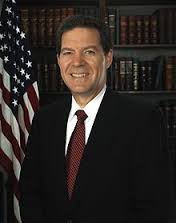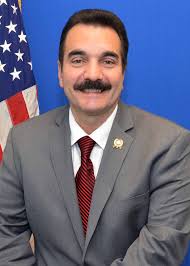Sheldon Adelson‘s apparent use of Las Vegas Review-Journal reporters to get back at Judge Elizabeth Gonzalez is putting him and his purchase of the newspaper under the microscope of the Nevada Gaming Control Board. Casino owners aren’t barred from owning newspapers, gosh knows,  but are liable for activity that “might reflect discredit upon the state.” According to the New York Times, the anti-Gonzalez piece “appeared to use fabricated quotations and had the byline of a person who does not appear to exist.” The Adelson purchase has also attracted regulatory scrutiny in Pennsylvania. Ironically, Adelson and Las Vegas Sands are refusing interview requests from the very newspaper the Adelson family owns.
but are liable for activity that “might reflect discredit upon the state.” According to the New York Times, the anti-Gonzalez piece “appeared to use fabricated quotations and had the byline of a person who does not appear to exist.” The Adelson purchase has also attracted regulatory scrutiny in Pennsylvania. Ironically, Adelson and Las Vegas Sands are refusing interview requests from the very newspaper the Adelson family owns.
Adelson has already said he might import “positive characteristics” to make the Review-Journal more like his Israel Hayom. The latter is so closely aligned with the agenda of Israeli Prime Minister Benjamin “Bibi” Netanyahu that it is waggishly referred to as “Bibiton.” Las Vegans are bracing themselves for the moment — if it has not already arrived — when the R-J becomes a megaphone for Adelson’s civic and political agenda, elevating his favorites and punishing his detractors. Adelson’s flunkies are making buyout offers to “qualified employees,” causing one to wonder to what end this housecleaning is being done.
Already, after being publicly humiliated by Adelson’s lackey-in-chief, Michael Schroeder, editor Michael Hengel has quit. Although both the NYT and the R-J reported that he took a “voluntary buyout,” Hengel told the Los Angeles Times that “he first learned of his acceptance of the buyout when someone from the newspaper read the [Adelson family] editorial to him over the telephone Tuesday night.” Reporters are said to be circulating their resumes and “reporting now just out of angst.” Whatever ‘positive’ changes Adelson is going to bring to journalism in Las Vegas, we’ve yet to see any.
* The dreaded Penn National Effect (revenue exaggeration) has hit Penn National Gaming at its Massachusetts racino, Plainridge Park. Initial projections of $300 million in annual revenue have been nearly halved and a Boston Globe reporter found Plainridge’s gaming floor thinly populated, the
 consensus of players at rival Twin River Casino being that Plainridge is “too small, too focused on slot machines, or too stingy.” Twin River, meanwhile, has upgraded to a Vegas-style casino, with amenities that Plainridge — where electronic table games have bombed — cannot match. Said Boston College gaming expert Richard McGowan, “A slots parlor — that just doesn’t cut it anymore. Plainridge is going after 60-year-olds, 70-year-olds, 80-year-olds. It’s a nice little crowd to go after, but it’s certainly limited.” Indeed, a boffo opening month ($18 million) has been followed by dwindling revenues — $11 million in November.
consensus of players at rival Twin River Casino being that Plainridge is “too small, too focused on slot machines, or too stingy.” Twin River, meanwhile, has upgraded to a Vegas-style casino, with amenities that Plainridge — where electronic table games have bombed — cannot match. Said Boston College gaming expert Richard McGowan, “A slots parlor — that just doesn’t cut it anymore. Plainridge is going after 60-year-olds, 70-year-olds, 80-year-olds. It’s a nice little crowd to go after, but it’s certainly limited.” Indeed, a boffo opening month ($18 million) has been followed by dwindling revenues — $11 million in November.
A spokesman for Speaker of the House Robert De Leo
(D), an early casino backer, said DeLeo is “watching closely” the Plainridge situation. Don’t be surprised if legislation materializes to upgrade the racino with table games, abandoning the three-casinos-plus-one-slot-parlor formula that was hammered out with such great deliberation with then-Gov. Deval Patrick (D). Massachusetts Gaming Commission Chairman  Stephen Crosby, meanwhile, took the long view, pointing out that Plainridge is only six months old and needs more time before the verdict comes in. He’s certainly got the numbers to back it: $2 million in local purchases, nearly $3 million in fees and $1.5 million in property taxes.
Stephen Crosby, meanwhile, took the long view, pointing out that Plainridge is only six months old and needs more time before the verdict comes in. He’s certainly got the numbers to back it: $2 million in local purchases, nearly $3 million in fees and $1.5 million in property taxes.
Crosby argues “in the first four full months of Plainridge operation, slot machine revenues in the five casinos in Rhode Island, Connecticut and Massachusetts have increased by $37 million. All of that growth has been in the Plainridge facility. And meanwhile, Plainridge seems to have recaptured $22 million in slot revenue from its competitors — a major objective of the [2011] legislation.” Penn, for its part, is taking a ‘wait ’til next year’ stance, predicting a turnaround in Plainridge’s performance once the calendar flips over to 2016.
* The court system dealt a defeat to Kansas Gov. Sam Brownback (R) in his effort to keep the Quapaw Tribe of Oklahoma from extending its Downstream Casino Resort across the state line into tribal land in Kansas.  Brownback had sued the National Indian Gaming Commission, the tribe, sundry federal officials and 18 tribal members “most of whom had no authority for or involvement in gaming.” Brownback — who had encouraged the tribe to obtain an advisory letter from the NIGC — initially engaged in compact talks with the Quapaw, then did an about-face on the whole matter, leading to accusations of negotiating in bad faith. Said tribal Chairman John L. Berrey, “This case should cause people in Kansas to ask a lot of questions, especially about Governor Brownback’s treatment of Indians and use of taxpayers’ money.”
Brownback had sued the National Indian Gaming Commission, the tribe, sundry federal officials and 18 tribal members “most of whom had no authority for or involvement in gaming.” Brownback — who had encouraged the tribe to obtain an advisory letter from the NIGC — initially engaged in compact talks with the Quapaw, then did an about-face on the whole matter, leading to accusations of negotiating in bad faith. Said tribal Chairman John L. Berrey, “This case should cause people in Kansas to ask a lot of questions, especially about Governor Brownback’s treatment of Indians and use of taxpayers’ money.”
* Contending that Atlantic City has had time enough to get its house in order, New Jersey Speaker of the Assembly Vincent Prieto (D), is taking his case to the newspapers, lobbying for a compromise bill that will enable a referendum to be held as part of the 2016 election ballot. He points to  various concessions that have already been made: only two northern-tier casinos instead of three, 50% of the first $300 million in new tax revenue to go to Atlantic City, tapering down to 35% (including a set-aside for the horseracing industry). He balks somewhat at the Assembly’s requirement that at least one new license holder be an Atlantic City operator but ultimately accepts it as a necessary compromise. “This [tax formula] would also mean less immediate money for programs and property tax relief for senior citizens and disabled residents, which has been a main goal of mine, but such is compromise,” Prieto sighs. We don’t know if this appeal to the masses will persuade the state senate to meet Prieto halfway but give him credit for trying.
various concessions that have already been made: only two northern-tier casinos instead of three, 50% of the first $300 million in new tax revenue to go to Atlantic City, tapering down to 35% (including a set-aside for the horseracing industry). He balks somewhat at the Assembly’s requirement that at least one new license holder be an Atlantic City operator but ultimately accepts it as a necessary compromise. “This [tax formula] would also mean less immediate money for programs and property tax relief for senior citizens and disabled residents, which has been a main goal of mine, but such is compromise,” Prieto sighs. We don’t know if this appeal to the masses will persuade the state senate to meet Prieto halfway but give him credit for trying.

